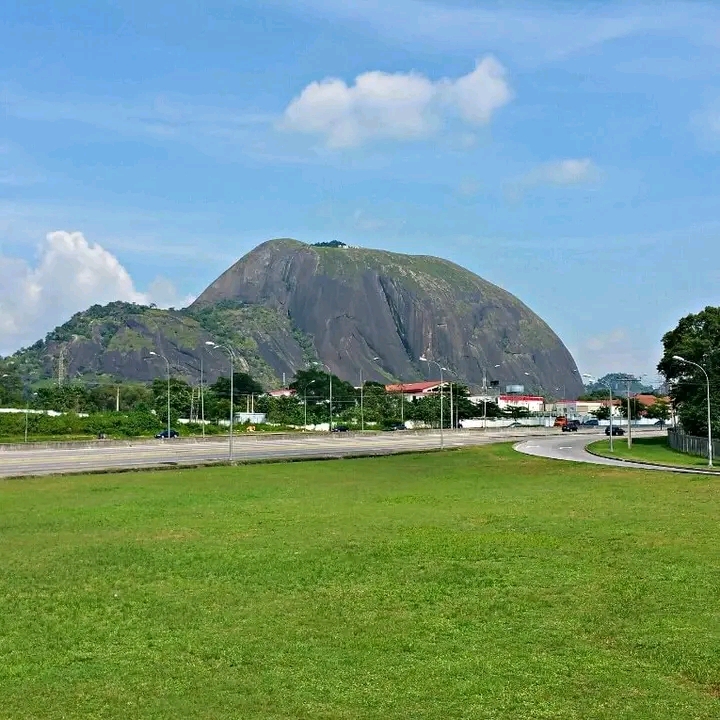
Tackling the Terrain: The Annual Abuja Mountain Bike Challenge Experience
The Annual Abuja Mountain Bike Challenge brings mountain bike enthusiasts into the heart of Nigeria's challenging Federal Capital Territory terrain. With steep climbs, forested trails, and sweeping views, it’s a test of endurance and skill against a landscape that pushes riders to their limits.
Hydrate Consistently
Carry at least two liters of water and remember to drink regularly, especially during climbs and warmer hours to prevent dehydration.
Choose Rugged Tires
Opt for tires designed to handle loose gravel and rocky patches to reduce puncture risk and improve traction on varied terrain.
Start Early for Cooler Riding
Begin your ride at dawn to take advantage of cooler temperatures and avoid midday heat and potential afternoon showers.
Maintain Controlled Descents
Approach downhill sections cautiously; steep gradients and loose surfaces can quickly overwhelm unprepared riders.
Tackling the Terrain: The Annual Abuja Mountain Bike Challenge Experience
Every year, the Annual Abuja Mountain Bike Challenge invites riders to test their mettle against the rugged hills and forested trails surrounding Nigeria's Federal Capital Territory. This event isn’t merely a race—it’s an engagement with a landscape that commands respect. Spread across roughly 45 kilometers of mixed terrain, the course challenges riders with an elevation gain close to 900 meters, demanding stamina and technical skill in equal measure.
The route carves through thick woodlands where towering trees reach skyward, their branches whispering as the wind dares you onward. Trails slip underfoot in patches of loose gravel and compact dirt, while rocky outcrops push you to find balance in unexpected moments. Occasional river crossings murmur a dare, their currents nudging wheels and tires forward, never letting the pace slack.
The vantage points along the way reward effort with expansive views of Abuja's skyline far below, framed by the rolling hills that extend beyond, each ridge fiercely itself. Here, the wind carries a subtle mix of earth and wild leaves, a reminder that this terrain isn’t conquered but navigated with care.
Success in the challenge requires preparation. Hydration is critical; carry at least two liters of water and consider electrolyte replacements for the warmer months. Tires with good grip and puncture resistance handle the unpredictable paths. Wearing layered cycling gear suits the variable weather — mornings can start cool but heat quickly by midday. Start early to avoid the intense afternoon sun and the sudden tropical showers that sporadically sweep the region.
For beginners and adventurers alike, pacing is strategic. The climbs may stretch over kilometers, inviting a steady rhythm rather than an all-out sprint. Descents command control—rocks and gravel await those who rush. The course reflects nature’s raw presence, a force that tests and teaches. The Abuja Mountain Bike Challenge is more than a race; it’s an invitation to engage deliberately with a landscape that does not forgive carelessness.
Whether you come for competition or simply the thrill of the ride, this challenge rewards those willing to listen to the forest’s pulse, to adjust their ride to the land’s mood. In Abuja’s hills, adventure refuses to be tamed but welcomes every rider ready to navigate its fierce grace.
Nearby Trips
All Adventures
Boat Charters
Water Activities
Adventures near Abuja, Federal Capital Territory
Discover the unique and memorable adventures that make Abuja, Federal Capital Territory special.
Frequently Asked Questions
What is the total distance and elevation gain of the challenge?
The Annual Abuja Mountain Bike Challenge covers approximately 45 kilometers with an elevation gain of around 900 meters, combining long climbs and fast descents.
Are there water refill stations along the course?
Participants should plan to carry their own water as refill points are limited due to the remote nature of sections of the course.
Is the trail suitable for beginners?
While beginners can enjoy parts of the course, the full challenge is best suited for those with intermediate to advanced mountain biking skills due to technical terrain.
What wildlife might I encounter during the ride?
The forested areas shelter small mammals, myriad bird species like guinea fowl, and occasional sightings of colorful butterflies and reptiles, all quietly observing the cyclists.
Are there any cultural or historical sites near the challenge route?
The hills around Abuja hold significance for the Gwari people, with some sites marking traditional land use, providing a window into local heritage near the trails.
Can the challenge be ridden year-round?
The challenge is held annually considering seasonal weather patterns. While the trails are accessible year-round, the best riding is during dry and mild seasons to avoid slippery or flooded paths.
Recommended Gear
Mountain Bike with Suspension
A bike equipped with front suspension and durable tires is crucial to handle rocky, uneven, and sometimes slippery trails.
Hydration Pack
A hydration pack allows hands-free drinking and ensures you carry enough fluids to stay hydrated throughout the ride.
Protective Cycling Helmet
Safety first; a quality helmet protects against inevitable falls or collisions on technical sections.
Breathable, Layered Clothing
Layering adapts you to changing temperatures from cool mornings to warmer midday heat while managing sweat effectively.
Local Insights
Hidden Gems
- "The 'Eagles Lookout'—a rarely marked vantage offering a stunning westward view over the FCT during sunset."
- "A secluded natural spring halfway along the route known locally for its cool, clear water."
Wildlife
- "Guinea fowl"
- "Agama lizards"
- "Forest squirrels"
- "Various native bird species including weavers and hornbills"
History
"The hills around Abuja were historically inhabited by the Gwari (Gbagyi) people, who still regard the lands as spiritually important. Some trails follow old paths used in traditional hunting and gathering."
